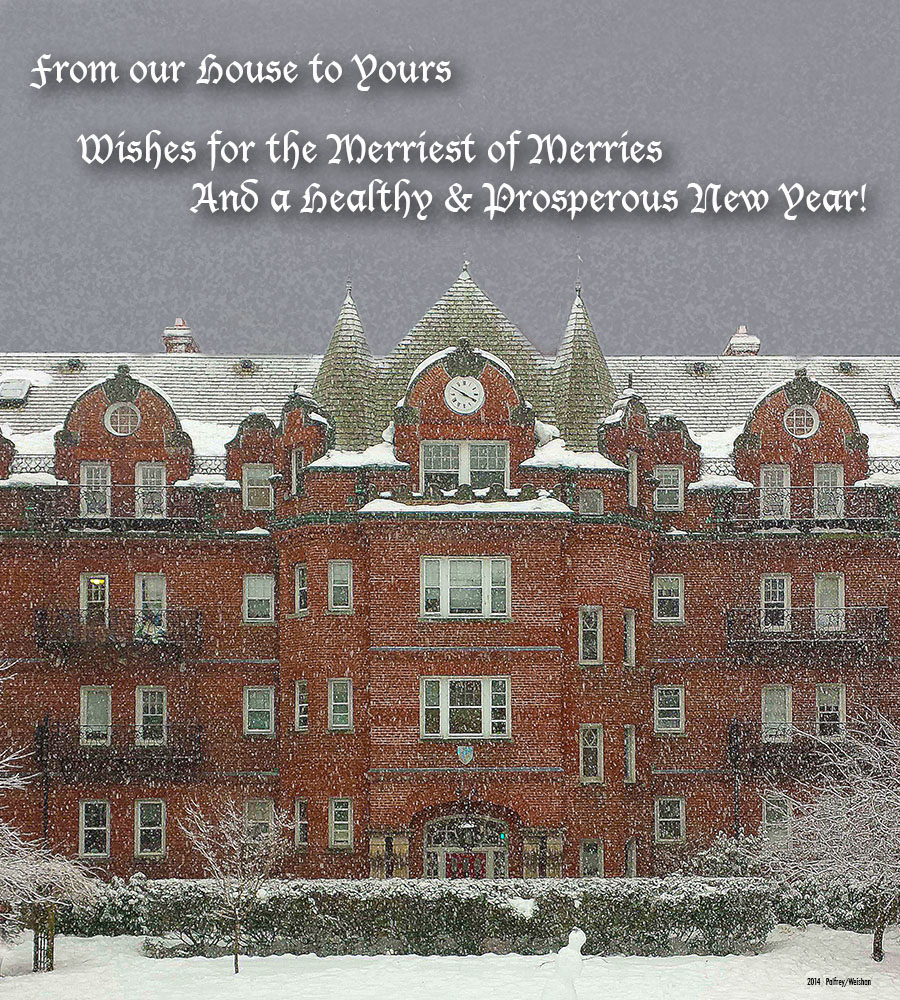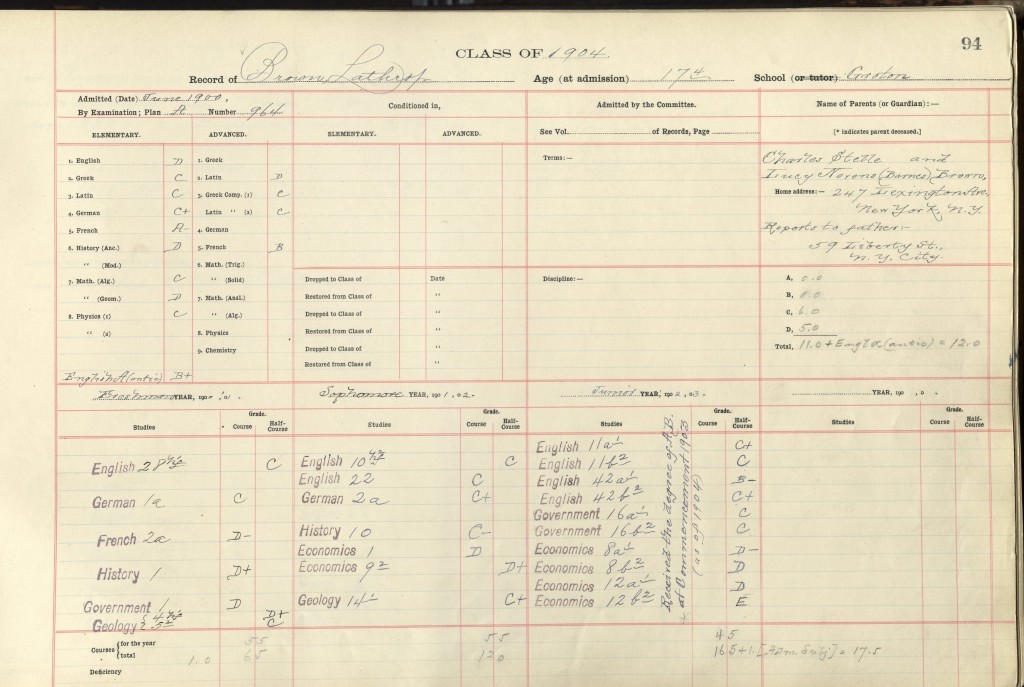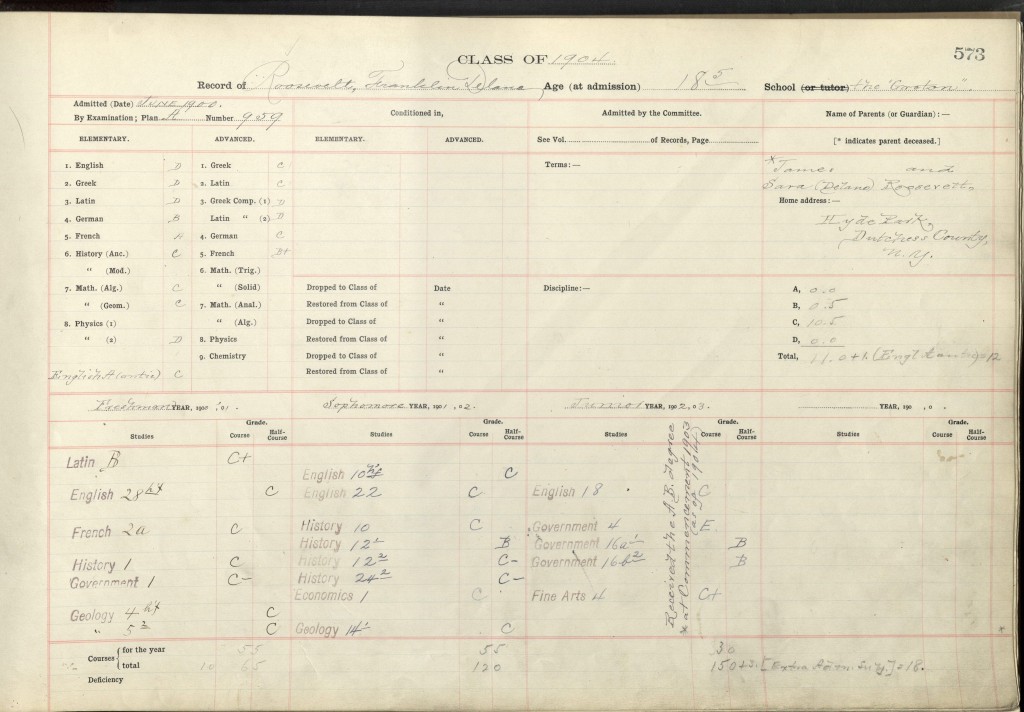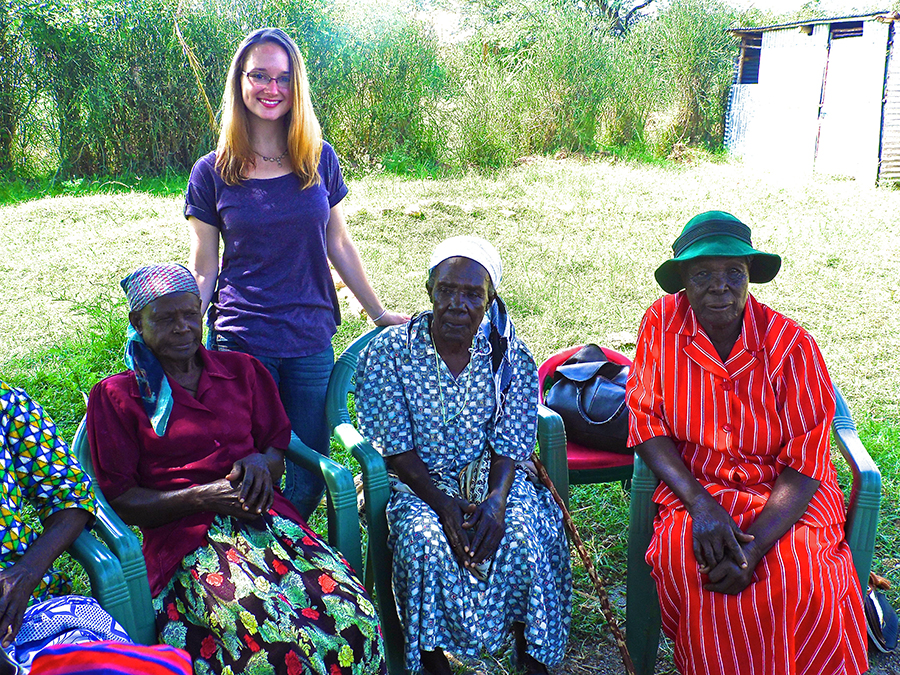Here’s a Health to King Charles
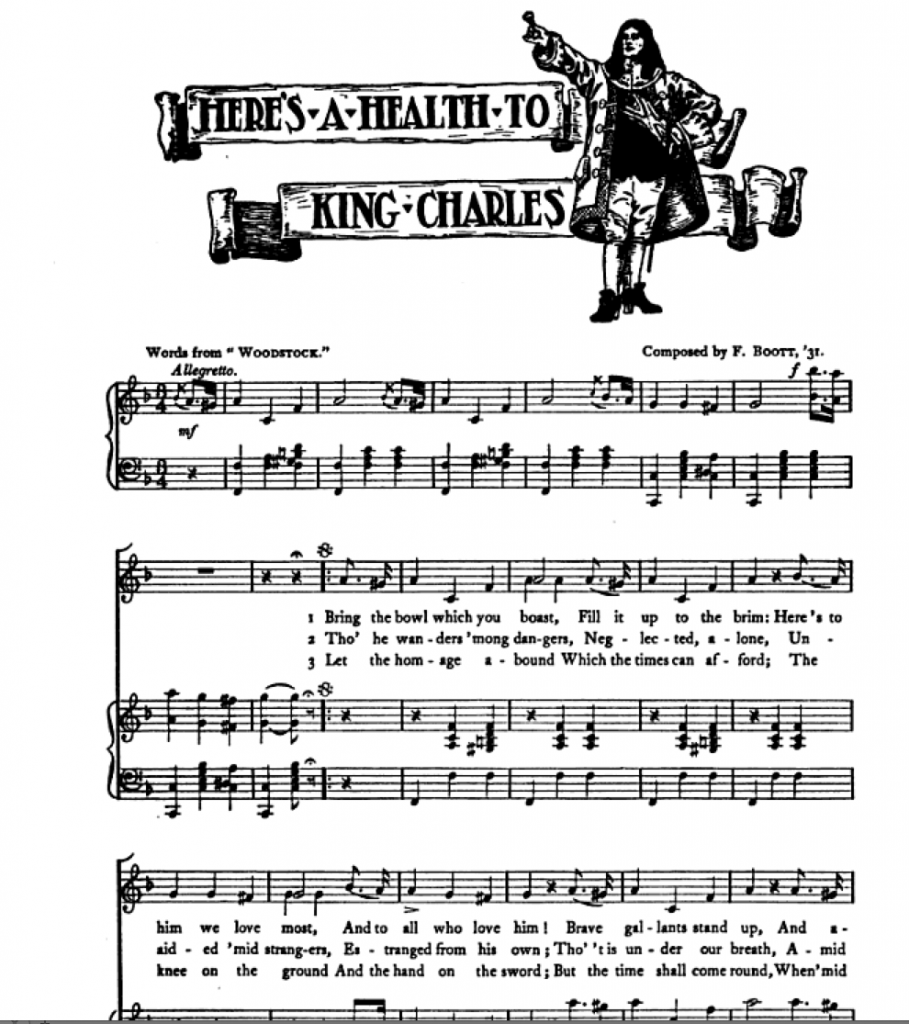 Throughout the course of the the Restoration, I’ve been continually surprised and delighted to find little gateways back in time. Here’s another one. Last year, my dear friend Abbot Peterson ’58 died. Recently, his widow – another dear friend – Barbara, was cleaning out some files and came across an old 78. Labelled “Alvin V Laird sings to the class of 1904”, it had been mailed in 1950 to Abbot’s father, Abbot Peterson II, a member of FDR’s class. (As was Mr. Laird.)
Throughout the course of the the Restoration, I’ve been continually surprised and delighted to find little gateways back in time. Here’s another one. Last year, my dear friend Abbot Peterson ’58 died. Recently, his widow – another dear friend – Barbara, was cleaning out some files and came across an old 78. Labelled “Alvin V Laird sings to the class of 1904”, it had been mailed in 1950 to Abbot’s father, Abbot Peterson II, a member of FDR’s class. (As was Mr. Laird.)
The 78 contained two songs: “A Health to King Charles” and “Dolores.” I haven’t been able to gather much information on “Dolores,” but “King Charles” was a very widely sung drinking ditty which would have been immediately recognized by FDR and Lathrop. The song is based on a poem by Sir Walter Scott (1771–1832) and perfectly embodies the Victorian romantic longing for causes lost:
BRING the bowl which you boast
Fill it up to the brim;
’Tis to him we love most,
And to all who love him.
Brave gallants, stand up,
And avaunt ye, base carles!
Were there death in the cup,
Here’s a health to King Charles.
Though he wanders through dangers,
Unaided, unknown,
Dependent on strangers,
Estranged from his own;
Though ’tis under our breath,
Amidst forfeits and perils,
Here’s to honor and faith,
And a health to King Charles!
Let such honors abound
As the time can afford,
The knee on the ground,
And the hand on the sword;
But the time shall come round
When, ’mid Lords, Dukes, and Earls,
The loud trumpet shall sound,
Here’s a health to King Charles!
So here, after tracking down someone who still had the means to play and digitize a 78 (!!!), for the first time in over a century, may I present to you: “Here’s a Health to King Charles”
Click the bar below to listen
Audio PlayerThis song, by the way, is part of an ongoing process to make a CD of “The Music of FDR’s Harvard” that will contain many of these wonderful old melodies well overdue for a come back. As always, your help in making this and our other work possible is greatly appreciated
We’re featured in Harvard Magazine!
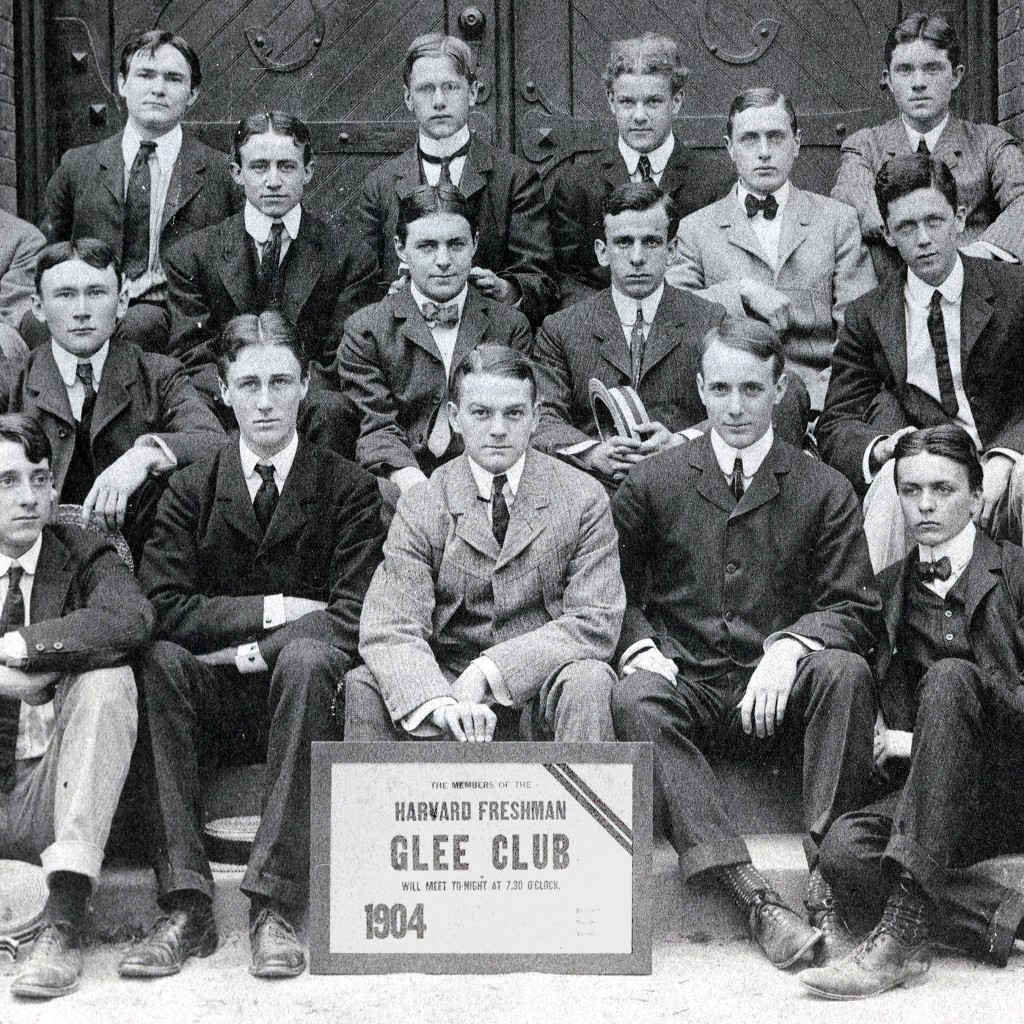
Taken in the fall of 1900, a young FDR (front row second from left) and Lathrop Brown (front row, far right) gaze serenely into their Harvard future.
To mark the debut of the Ken Burns PBS series on the Roosevelts this Sunday, Harvard Magazine has reprinted Geoffrey Ward’s remarks at the Sixth Annual FDR Memorial Lecture this past May. For those of you who were unable to attend, here’s your chance. Take a look HERE.
Progress Report: FDR Fellow and Goldman Scholar Gina Kim in Korea
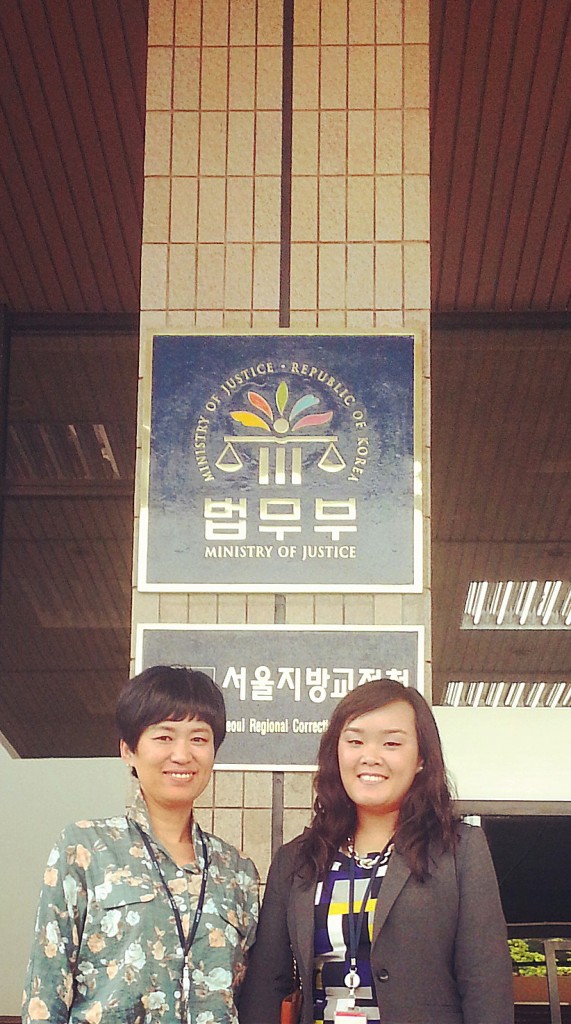
At the Ministry of Justice with Mi-Young Ahn, the Chief Prosecutor of the Human Rights Policy Division.
This post FDR Global Fellow and Lillian Goldman Scholar Gina Kim reports in from Korea — MDW
My first few weeks in Seoul have been incredible in more ways than one. First and foremost, despite initial challenges securing interviews in Korea, I was able to utilize family connections to obtain diverse and fantastic contacts. One highlight was having the chance to go to the Ministry of Justice (the equivalent of the U.S. Department of Justice) to interview the Chief Prosecutor of the Human Rights Policy Division. Not only was her interview incredibly helpful, she also had her staff prepare literature on human trafficking in South Korea for me to take back. Having the opportunity to actually come to East Asia to research on the ground has been very rewarding. I am learning so much more from independent research than I did from classes and books. I have a new-found appreciation for this fight against human trafficking that so many amazing people are engaged in. I am also learning to appreciate the huge challenges of conducting independent research, particularly on a topic as controversial and nuanced as human trafficking policy changes.
So, what drives human trafficking policy changes? Is it NGOs, the media, political will, or foreign pressure? The easy answer is that it is all of the above factors. However, one thing I have discovered is that the way the issue is framed and the word choice used is incredibly important for the creation of policy changes. My interviews have suggested that details such as the type of trafficking (e.g. labor trafficking, sex trafficking), a victim’s gender, or nationality can be crucial to the popularity of a news article or the viability of a policy change. For example, in South Korea, combatting human trafficking becomes much more politically contentious when it is in regards to North Korean refugees.
On a lighter note, Seoul is the coolest city I have ever been to. It is so modern and efficient on one hand, but on the other, it is not difficult to find ancient history and culture. Seoul is also very convenient in that there are so many places to eat, shop, and hang out. It feels like such a big city not only in population, but also in area–it almost seems to me like there is a different metropolitan city at each subway stop. Overall, I am having a wonderful experience in Seoul.
The Real Gentleman’s C
If you google the term “gentleman’s C,” chances are you’ll come up with some version of: “a grade given by certain schools (often Ivy League) to the children of wealthy or influential families in lieu of a failing grade” — that’s certainly what I always thought the term meant. But in FDR’s day, the meaning of a “gentleman’s C” was entirely different. A “C” was the grade a gentleman aspired to, so as not to seem too interested in studies and be considered a “grind.”
A 1909 verse by Robert Grant, ’73, LL.B. 1879, explains this neatly:
The able-bodied C man! He sails swimmingly along.
His philosophy is rosy as a skylark’s matin song.
The light of his ambition is respectably to pass,
And to hold a firm position in the middle of his class.
Should you try to hard, you became the stuff of parody, as the “The Grind’s Song” from the 1902 Hasty Pudding Show HI.KA.YA reveals:
I’m a typical College grind,
I look it, you’ll admit, you’ll admit, you’ll admit
You’ve heard it’s a grind to be a grind
Not a bit, not a bit, not a bit! Just the opposite!
Don’t let my words belie my looks
My happiness is in my books
I love to work, I hate to play
For me life’s simply the other way
Don’t enlist your sympathy, I’m as happy as can be,
For to read my Latin Grammar is life in Arcadie!
To document how much things have changed, I thought you might be interested in seeing the study cards of FDR and Lathrop, president and congressman of the United States, respectively. We’ve recently received copies from the Archives, and will reproduce them for viewing in the Suite. The upper right hand corner reveals their entrance examination results, and year by year grades proceed from left to right across the bottom.
Click on each to view them full scale.
As you can see, both FDR and Lathrop (especially Lathrop!) eschewed any possibility of being viewed as a grind! I find this fascinating, not only because it reveals a student ethos so foreign to the current one, but also because it shows the level of grade inflation since the Vietnam War when most universities across the country, including Harvard, felt the pressure of keeping students from falling below a B average and thereby opening them up to the draft. The result was a rapid escalation of grades, to the point where the average grade at Harvard is now -A. (One of our undergraduates recently made the suggestion during a Suite tour that there hadn’t been grade inflation at all, rather that the current students were just smarter, which left me and several of my peers a moment to wonder at the folly of youth.)
On an entirely different subject, today is the last day of the fiscal year, and our coffers are looking uncomfortably bare, given the roster of programming we have planned for the next academic year. I’d like to urge any of you who have been thinking about making a contribution to the numerous activities of the Foundation, that now is time to so! It’s quick, secure and takes only a few seconds online.
“The Only Way to Have a Friend Is To Be One”
This summer, I’ve asked our Franklin Delano Roosevelt Fellows to check in periodically to let us know how they are doing. Here’s the first report, from Amanda Hess, in Kenya: MDW
So far this trip has been absolutely incredible! The classes and educational aspect of this experience are exceptional but it’s the Kenyan people who’ve made it so profound for me. I’m working with a community based organization called St. Ann’s. They represent a small village about 45 minutes outside of town. This little community has been nearly devastated from HIV/Aids, an annual cholera outbreak from nearly nonexistent water sanitation, and a generalized poverty which has it’s grip on every home I’ve visited so far.
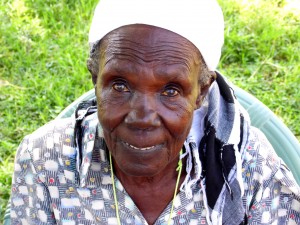 I’m working closely with the matriarch of this village, Lorane. She is a widowed superwoman. After 5 children, the youngest suffering from a mental disability which prevents him from being able to speak, HIV killed her husband. She’s poured herself not only into her family (all of her capable children have either gone to or are in college) but also her community. She’s begun a micro lending program for the grandmothers of their village and she lead the plea for the installation of a water kiosk, which will provide everyone with clean drinking water.
I’m working closely with the matriarch of this village, Lorane. She is a widowed superwoman. After 5 children, the youngest suffering from a mental disability which prevents him from being able to speak, HIV killed her husband. She’s poured herself not only into her family (all of her capable children have either gone to or are in college) but also her community. She’s begun a micro lending program for the grandmothers of their village and she lead the plea for the installation of a water kiosk, which will provide everyone with clean drinking water.
My project is to offer this community with something sustainable that will lead to their betterment and a heightened quality of life with the fewest unintended negative consequences as possible. At first, this was a bit daunting. However, I believe that I’ve devised a program that will actually make a substantial difference for these beautiful people.
Because of the HIV/Aids pandemic about 97 children have been orphaned as a result. Most often these children have no family members who are either close enough in proximity to take care of them or they are too impoverished to offer them anything that would make much of a difference. Also, because these deceased parents were usually unable to work in the last year to several months of their life they’ve left their children with no inheritance. So, the eldest of the siblings is responsible for taking care of the younger children. (Often times the eldest is a boy and there is a huge cultural stigma against men rearing children and this has posed to be an unusual barrier in their advancing within society.)
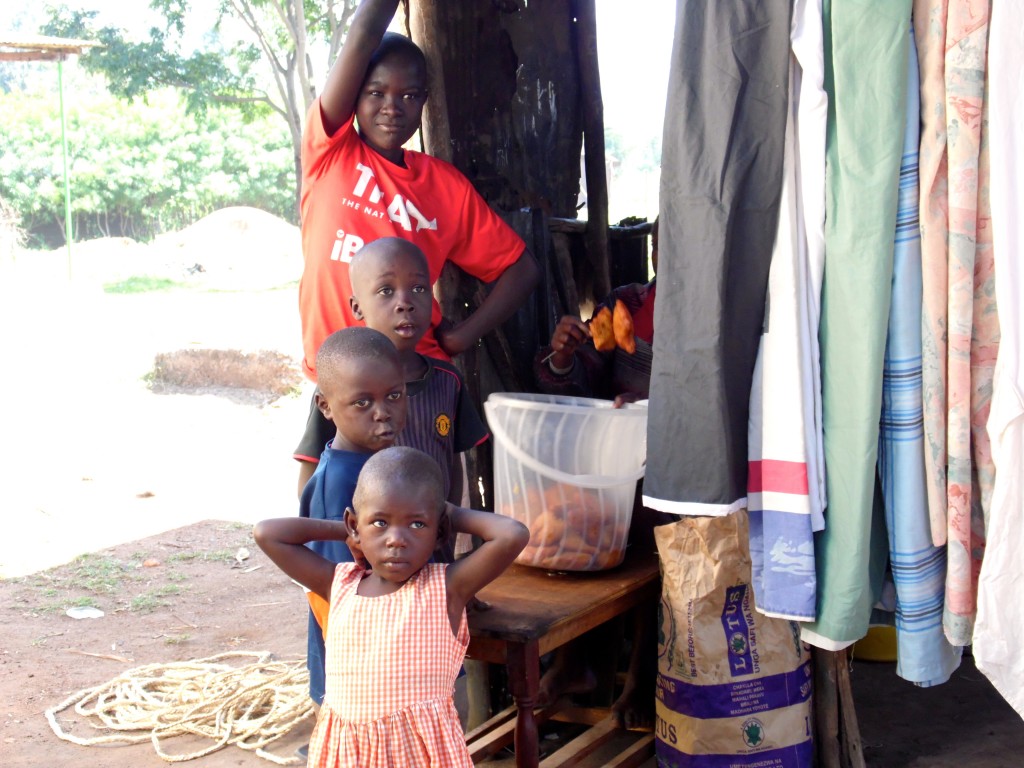 My program will be a joint micro-lending/mentorship program geared towards supporting these eldest orphan children who have nothing but are still expected to provide for their siblings. These children will be paired with a mentor; someone from the community who is trustworthy and also a business owner. this mentor will act as a co-signer for a micro loan from Kiva (we’ve already begun the process for setting them up with profiles) that will be awarded to our young entrepreneurs once they have devised a business plan with the help of myself and their mentor. (Training will also include basic personal finance management and accounting.) The mentors will work closely with their apprentices to establish the business and repay the loan. As incentive for our mentors, once the loan is repaid and the business has stabilized (making an average daily living wage for the child and the child’s family) the mentor will receive %10 of the profits and will continue to aid the child with their accounting, savings, and finding and maintaining healthy business relationships with clientele. The %10 is also reason for the mentor to do everything possible to make sure the business is thriving because the better the business dose, the higher that %10 will be.
My program will be a joint micro-lending/mentorship program geared towards supporting these eldest orphan children who have nothing but are still expected to provide for their siblings. These children will be paired with a mentor; someone from the community who is trustworthy and also a business owner. this mentor will act as a co-signer for a micro loan from Kiva (we’ve already begun the process for setting them up with profiles) that will be awarded to our young entrepreneurs once they have devised a business plan with the help of myself and their mentor. (Training will also include basic personal finance management and accounting.) The mentors will work closely with their apprentices to establish the business and repay the loan. As incentive for our mentors, once the loan is repaid and the business has stabilized (making an average daily living wage for the child and the child’s family) the mentor will receive %10 of the profits and will continue to aid the child with their accounting, savings, and finding and maintaining healthy business relationships with clientele. The %10 is also reason for the mentor to do everything possible to make sure the business is thriving because the better the business dose, the higher that %10 will be.
The mentor/apprentice pair will report bi-weekly to the community board. This includes the chair members of St. Ann’s as well as the Chief of the village. During these meetings the progress of the business will be reported and if any obstacles or problems have arisen the board will offer advice and assistance whenever necessary. Board members will also be given the authority to “check in” on the pairs whenever they like, similar to a health inspector, as a way to ensure the child’s protection from any sort of corruption.
The chief has volunteered to serve as a mentor to the mentors. They will have a monthly meeting to make sure everything is running smoothly and to offer one another ideas, advice, and potentially partner whenever possible. Once our young entrepreneurs are capable of running their business on their own (something that will be determined by the board and the child) they will take over 100% of the profits.
The community is incredibly excited to get started and I am so thrilled that they’ve been so receptive to my plan. Next week we’ll be pairing our mentors with the children. (On average these kids are around 16)
Thank you again for your support and I’ll be sure to send updates as the program develops!

